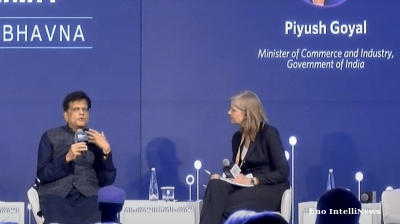Five Polish presidential candidates excluded from TV debate after final list of 13 contestants published

Poland’s National Electoral Commission (PKW) confirmed the final list of 13 candidates who will compete in the May 18 presidential election, but scandal broke out after five of them were excluded from a debate on state TV.
The thirteen contenders in the election equals the most that have ever stood and comprise the survivors from the 17 candidates that applied to run for the office. Four candidacies were rejected by the PKW, which ruled that some of the required signatures were invalid. Some of the candidates had submitted thousands of names belonging to dead people, according to reports.
The elections are seen as crucial for Poland’s future as Polish Prime Minister Donald Tusk’s pro-European Union coalition is pit against the conservative Law and Justice (PiS) party. The current president Polish President Andrzej Duda, who is an ally of PiS, is completing his second term in office and is due to stand down. While the president has limited powers under the Polish constitution, he can nevertheless make life difficult for the Union coalition.
With the final line confirmed a fresh scandal broke out after five of the candidates were excluded from a televised debate. Poland’s state-owned broadcaster Telewizja Polska (TVP) has come under fire following a presidential debate on April 11 that excluded five registered candidates, prompting threats of legal action that could potentially annul the upcoming election.
In parallel, Tusk was accused of riding roughshod over freedom of speech principles after a Warsaw court revoked the broadcast licences of two conservative TV stations a day earlier, TV Republika and wPolsce 24.
The debate, held in the town of Końskie, was officially classified as a campaign event organised by Rafał Trzaskowski, the liberal Mayor of Warsaw and candidate for the Civic Coalition (KO) in the presidential election, which is led by Tusk.
Although moderated jointly by TVP and private networks TVN and Polsat, the format and organisation drew criticism for breaching the Polish electoral code, which mandates equal airtime and debate access for all registered presidential candidates.
Initially conceived on April 9 as a bilateral exchange between the front-runner Trzaskowski and Karol Nawrocki, the candidate for the opposition Law and Justice (PiS) party who is in second place, according to the polls, the event provoked immediate objections.
Rival candidates condemned what they perceived as a violation of the law, with some travelling to Końskie to participate in an alternative debate hosted by conservative channel TV Republika, which has now been shut down.
Szymon Hołownia, Speaker of the Sejm and candidate for a ruling coalition party, said he intended to appear at the debate regardless of the controversy.
Trzaskowski reversed course just two hours before the debate commenced, inviting all candidates to join under pressure from Nawrocki, who expressed solidarity with those excluded. However, the short notice drew criticism from candidates who were unable to reach the venue in time.
Confederation party’s Sławomir Mentzen, polling third with over 15%, was 200 km away on a campaign tour, while left-wing candidate Adrian Zandberg, polling at 5%, was engaged in a meeting with President Duda.
Mentzen labelled the situation a “circus” with “Belarusian debating standards”, accusing Trzaskowski and Nawrocki of a coordinated “set-up”, Brussels Signal reports. Confederation MP Przemysław Wipler argued on social media that the event constituted “grounds for annulling the election”. Zandberg announced plans to report Trzaskowski’s campaign to the public prosecutor for alleged breaches of election law.
Tensions escalated further when Trzaskowski’s security team forcibly removed journalists from conservative outlets TV Republika and wPolsce24, and denied access to several of Nawrocki’s campaign staff. Republican party candidate Marek Jakubiak said he was initially barred from entering but eventually found his way in, while independent candidate Krzysztof Stanowski complained about the lack of clarity on debate procedures even after being admitted.
The debate lasted over three hours and was broadcast widely across multiple networks. A dramatic moment occurred when Nawrocki placed a rainbow flag on Trzaskowski’s lectern to highlight his opponent’s support for LGBT rights. Trzaskowski removed the flag, stating he identified “only with the Polish flag.” In response, Magdalena Biejat, the Left’s candidate, took the flag and declared she had “no problem identifying with LGBT people.”
The first round of the presidential election is scheduled for May 18, with a potential runoff set for June 1.
Notes from Poland reports that the final list of candidates (in alphabetical order) is:
- Bartoszewicz, Artur
- Biejat, Magdalena
- Braun, Grzegorz
- Hołownia, Szymon
- Jakubiak, Marek
- Maciak, Maciej
- Mentzen, Sławomir
- Nawrocki, Karol
- Senyszyn, Joanna
- Stanowski, Krzysztof
- Trzaskowski, Rafał
- Woch, Marek
- Zandberg, Adrian
News

Tajik opposition files international lawsuit accusing government of crimes against humanity
Court decision likely years in making.

Azerbaijan's central bank halts disclosure of FX auction results
Decision reduces transparency around FX operations that were previously disclosed every Tuesday and Thursday.

Polish opposition slams “brutal” Tusk for revoking broadcaster licence
The Polish opposition slammed Polish Prime Minister Donald Tusk for riding roughshod over freedom of speech principles after a Warsaw court revoked the licence of the TV Republika and wPolsce 24 independent conservative broadcasters.

Chinese state media spotlights Hungary’s cost-of-living crisis in rare rebuke
Hungarian families are being squeezed by Europe's fastest-rising living costs, according to a rare and striking report aired over the weekend by CGTN, the international arm of China’s state-controlled media.


